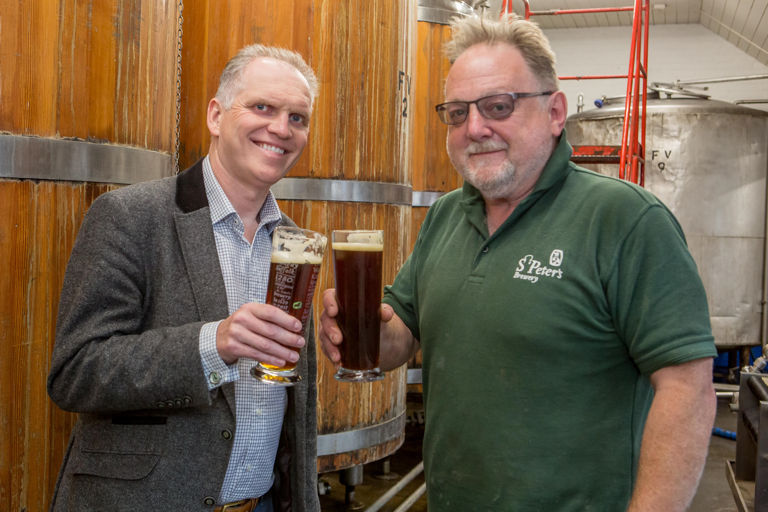Santé! How St Peter's Brewery exported to France

Posted: Thu 23rd Feb 2017
St Peter's Brewery was one of Britain's first craft micro breweries and from small beginnings the company's beers are now sold in 50 countries.
One of the business' most successful markets is France and, in this interview, CEO Steve Magnall discusses how St Peter's has done it.
Tell us the story behind St Peter's Brewery and how it was set up and has grown.
St Peter's Brewery was founded in 1995 by Interbrand Consultancy founder, John Murphy who saw a growing appetite for quality British craft beer overseas and was one of the first craft micro-breweries in the UK.
St Peter's Brewery is sited by a 13th century manor house near Bungay in Suffolk and uses water from a deep bore hole to create a range of craft beers such as ales, bitters and IPAs, as well as a lifestyle range of organic, gluten free and alcohol-free beers. The beer is sold in unique and distinctive oval bottles. Both the history and the unique bottle shape has proved a huge draw for the international export market.
The brewery employed six people when it first started in 1995 and was only capable of producing 3,000 pints at a time. Over 20 years on and we now employ 42 members of staff and produce in excess of four million pints a year.
St Peter's exports to 50 countries across the world with our beers also sold to the UK market both through the on trade in bottle and cask and to retail through the likes of Tesco, Waitrose and The Co-op. We also operates our own pub, The Jerusalem Tavern, in Clerkenwell in London.
Where are your products sold in France and why did you target those stockists?
Exporting is a huge part of our business and at certain times our beers can be found in up to 50 countries across the world. Export sales make up about 50% of our overall sales, so targeting the right export markets is hugely important to our business strategy.
We have been exporting our range of craft beers into France for some time and work with three importers, each one located in different areas across the country to ensure even coverage and distribution. Each of the importers we work with sells to the off-trade, local shops and the on-trade so our products can be found in all kind of outlets from shops to bars, hotels and wholesale.

What research did you do before picking France as an export market for your products?
The important thing for us before we began exporting to France was to consider what kind of products people were looking for, what size of bottle and what types of beers are most popular. We also researched different importers and targeted those that focused on drinks and that were strategically located to ensure maximum coverage of on-trade and off-trade premises.
How did you secure distributors for your products and what's your advice for business owners wanting to do the same?
We introduced our brands to our importers by presenting the deep history and story behind St Peter's products. We told them how we brewed all our beers on site in Suffolk with water from our own deep bore hole and presented the vast range of beers that we create.
As with most buyers, they want to know the background to the business and the products and we have found that if people can see how and where the products are made and understand the story behind the company. They then can feel connected to the brand and can pass that story on to potential consumers purchasing the products.
What key characteristics should UK food and drink entrepreneurs bear in mind when targeting the French consumer?
I can only really relate this to our own experiences, but we have found that just like with their wine, French consumers like a variety of different styles and flavours.
Our most popular products in France have been our range of speciality beers such as Honey Porter and Whisky Beer, to more traditional styles like our Best Bitter, so they certainly have an eclectic palate.
What are your three top tips for making a success of exporting to France?
Do your research and ensure you know the market before exporting so you can choose the right products to push.
Tell your story so the importers or distributors promoting your products can recreate the history and USP of your brand.
Make sure you are working with the correct importers who understand your products and can target the right markets for you.
Enterprise Nation member stories
Find inspiration from the brilliant small businesses in our ever-growing community. Read more stories
Get business support right to your inbox
Subscribe to our newsletter to receive business tips, learn about new funding programmes, join upcoming events, take e-learning courses, and more.
Start your business journey today
Take the first step to successfully starting and growing your business.
Join for free

